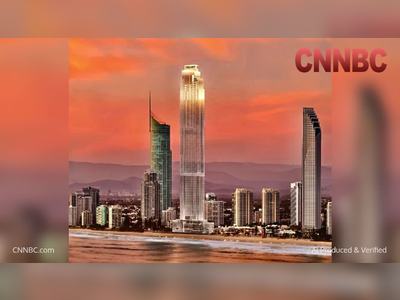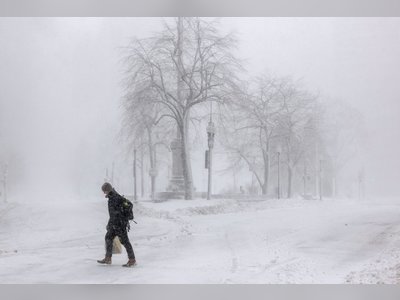European Imports of Russian LNG Surge to Record Levels Amidst Geopolitical Tensions
Europe's reliance on Russian liquefied natural gas grows, despite efforts to sever energy ties following conflict in Ukraine.
Europe's importation of liquefied natural gas (LNG) from Russia reached unprecedented levels last year, underscoring the continent's ongoing energy dependency despite concerted efforts to reduce reliance on Russian fossil fuels in the wake of the conflict in Ukraine.
According to data from Rystad Energy, 17.8 million tonnes of Russian LNG were delivered to European ports in 2024, a notable increase of over 2 million tonnes compared to the previous year.
Jan-Eric Fähnrich, a gas analyst at Rystad Energy, highlighted the surge, indicating that LNG imports were not only increasing but had reached 'record levels.' This influx occurs amid Europe’s significant reduction of pipeline gas imports from Russia, redirecting its energy procurement strategy by importing LNG from multiple nations, with Russia becoming the second-largest supplier behind the United States.
In 2024, Europe imported 49.5 billion cubic metres (bcm) of Russian gas via pipelines and an additional 24.2 bcm in LNG shipments, according to Fähnrich.
Notably, some of this LNG may have been resold to other countries.
This development coincides with Ukraine halting Russian gas flows through its pipelines, a legacy Soviet-era route, amid three years of military tensions between the two nations.
The continuation of Russian LNG imports has garnered criticism from various quarters.
Campaigners assert that the European Union's continued purchase of Russian fuels contradicts its support for Ukraine and its climate objectives.
Despite reductions in energy demand and regulatory easing for renewable energy projects, the EU is reportedly not transitioning its economy rapidly enough to meet climate goals, which aim to arrest planetary heating at 1.5°C (2.7°F) by century's end.
The Centre for Research on Energy and Clean Air (Crea) reported that the EU's import expenditure on Russian LNG amounted to €7.32 billion in 2024, with a 14% increase in volume, culminating in 17.5 million tonnes of imports.
Vaibhav Raghunandan, a Russia analyst at Crea, notes that Russian LNG is offered at competitive prices compared to alternatives, motivating companies to buy in their self-interest.
Although the EU plans to phase out Russian fossil fuel imports by 2027, a full ban on gas, unlike coal and oil, has not been imposed.
However, in June, EU member states consented to prohibit Russian LNG re-exports to non-EU countries effective from March 2025.
Analysts, including Fähnrich, suggest that the recent spike in Russian LNG imports may partly result from efforts to secure volumes before impending sanctions.
Ukrainian activists have criticized these developments, arguing that existing loopholes in sanctions allow Russia to continue financing its war efforts with fossil fuel revenues.
Svitlana Romanko, founder of the Ukrainian climate advocacy group Razom We Stand, urged the EU to enforce stricter prohibitions on Russian LNG imports and address weaknesses in the sanctions regime.
Romanko emphasized the potential environmental benefits of tightening sanctions, noting that doing so could slash upstream greenhouse gas emissions from Russia's oil and gas sectors by 25% by 2030.
If renewable energy were to replace fossil fuels, annual end-use emissions could decrease by 300 million tonnes.
The EU faces a pivotal choice, Romanko remarked, between perpetuating war and pollution or embracing a sustainable, secure energy future.
According to data from Rystad Energy, 17.8 million tonnes of Russian LNG were delivered to European ports in 2024, a notable increase of over 2 million tonnes compared to the previous year.
Jan-Eric Fähnrich, a gas analyst at Rystad Energy, highlighted the surge, indicating that LNG imports were not only increasing but had reached 'record levels.' This influx occurs amid Europe’s significant reduction of pipeline gas imports from Russia, redirecting its energy procurement strategy by importing LNG from multiple nations, with Russia becoming the second-largest supplier behind the United States.
In 2024, Europe imported 49.5 billion cubic metres (bcm) of Russian gas via pipelines and an additional 24.2 bcm in LNG shipments, according to Fähnrich.
Notably, some of this LNG may have been resold to other countries.
This development coincides with Ukraine halting Russian gas flows through its pipelines, a legacy Soviet-era route, amid three years of military tensions between the two nations.
The continuation of Russian LNG imports has garnered criticism from various quarters.
Campaigners assert that the European Union's continued purchase of Russian fuels contradicts its support for Ukraine and its climate objectives.
Despite reductions in energy demand and regulatory easing for renewable energy projects, the EU is reportedly not transitioning its economy rapidly enough to meet climate goals, which aim to arrest planetary heating at 1.5°C (2.7°F) by century's end.
The Centre for Research on Energy and Clean Air (Crea) reported that the EU's import expenditure on Russian LNG amounted to €7.32 billion in 2024, with a 14% increase in volume, culminating in 17.5 million tonnes of imports.
Vaibhav Raghunandan, a Russia analyst at Crea, notes that Russian LNG is offered at competitive prices compared to alternatives, motivating companies to buy in their self-interest.
Although the EU plans to phase out Russian fossil fuel imports by 2027, a full ban on gas, unlike coal and oil, has not been imposed.
However, in June, EU member states consented to prohibit Russian LNG re-exports to non-EU countries effective from March 2025.
Analysts, including Fähnrich, suggest that the recent spike in Russian LNG imports may partly result from efforts to secure volumes before impending sanctions.
Ukrainian activists have criticized these developments, arguing that existing loopholes in sanctions allow Russia to continue financing its war efforts with fossil fuel revenues.
Svitlana Romanko, founder of the Ukrainian climate advocacy group Razom We Stand, urged the EU to enforce stricter prohibitions on Russian LNG imports and address weaknesses in the sanctions regime.
Romanko emphasized the potential environmental benefits of tightening sanctions, noting that doing so could slash upstream greenhouse gas emissions from Russia's oil and gas sectors by 25% by 2030.
If renewable energy were to replace fossil fuels, annual end-use emissions could decrease by 300 million tonnes.
The EU faces a pivotal choice, Romanko remarked, between perpetuating war and pollution or embracing a sustainable, secure energy future.












